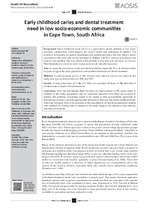Early childhood caries and dental treatment need in low socio-economic communities in Cape Town, South Africa
Abstract
BACKGROUND: Early childhood caries (ECC) is a particularly severe problem in low socioeconomic
communities which impacts the overall health and well-being of children. The
extensive waiting lists for general anaesthesia and sedation services at the only tertiary dental
care centre in the study area for the treatment of children with ECC were an indication of the
extent of the problem. The true extent of the problem in this area was, however, not known.
This information is crucial in order to plan and execute remedial measures.
AIM: To assess the prevalence of oral and dental problems, especially ECC, in children under
six years of age in the study population, and ascertain their need for dental treatment.
METHODS: A cross-sectional survey of 659 children from selected schools and clinics in the
study area was carried out between 2010 and 2013.
RESULTS: A caries prevalence of 71.6% (472/659) was recorded. Of these, 67.5% (445/659) of
children were in need of dental treatment.
CONCLUSION: Over the last decade, there has been no improvement in the caries status of
children in the study population, and no organised measures have been put in place to
address this problem. Awareness needs to be raised so that governments, especially in
developing countries, can take appropriate measures to alleviate this public health problem.
Time and resources have to be invested in the education of all health professionals dealing
with children, by raising their awareness of the early stages of the disease so that timeous
referrals can be made.

